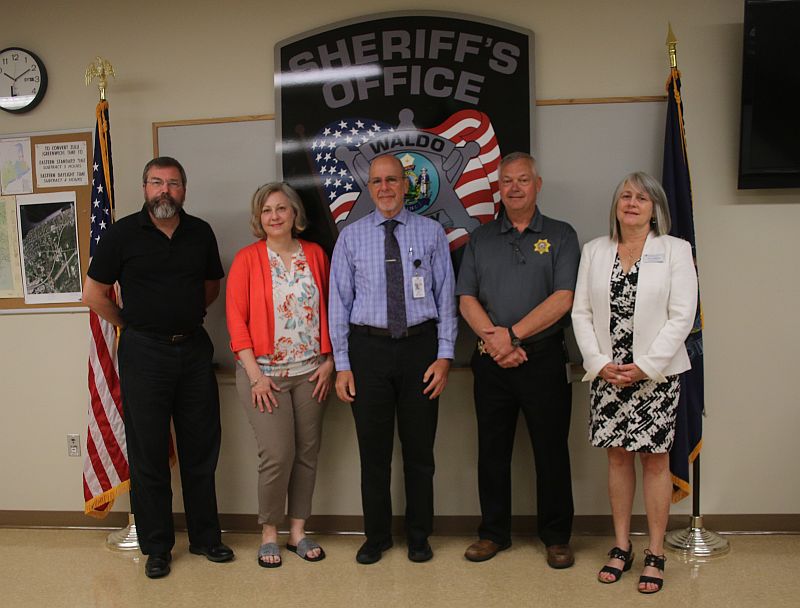Community liaison to join Waldo County Sheriff’s deputies on non-criminal calls
BELFAST — The Waldo County Sheriff’s Office looks forward to hiring its first-ever community liaison, a position that became available after the Waldo County Recovery Committee was able to secure funding for the position.
The committee, founded in June 2018, has met every Monday morning to discuss ways to help members of the community struggling with mental illness and/or substance abuse issues. Participating organizations include the Sheriff’s Office, Restorative Justice Project, Volunteers of America Northern New England, and Seaport Community Health Center, among others.
Seaport Community Health Center operates under the umbrella of Penobscot Community Health Care, the state’s largest federally qualified health center, according to a press release by Waldo County Sheriff’s Chief Deputy Jason Trundy.
In October 2019, PCHC received a $1 million grant from the Health Resources and Federal Services Administration in an effort to tackle the opioid crisis, a portion of which will be used to fund the new community liaison position.
Crisis co-responders
The idea of bringing a community liaison position to Waldo County has a model in one that was created by Portland Police.
“While attending the [opioid] Summit I was able to participate in a breakout session where Commissioner Mike Sauschuck and Oliver Bradeen spoke about Portland Police Department’s Behavioral Health Response Program, which is based on a comprehensive police-mental health collaboration,” Trundy wrote in a press release. “The program, which has been in existence for a number of years, is listed as a national law enforcement–mental health learning site by the Bureau of Justice Assistance. Commissioner Sauschuck served as the Chief of Police for the Portland Police Department during the developmental years of the program and Oliver Bradeen is employed as a crisis co-responder in the Behavioral Health Responder Program.”
Portland Police have had community liaisons working with their department for roughly 20 years, according to Trundy, who said it was Portland PD’s program that piqued his interest in taking the position to Waldo County.
“Basically they have an individual who supervises a behavioral unit and then they have individuals who focus specifically on mental health issues,” Trundy said. “Then they have individuals who focus specifically on substance abuse problems.”
It wasn’t until PCHC received the $1 million grant from the Health Resources and Federal Services Administration that Trundy realized there was an opportunity to bring his hopes to fruition. He said that Waldo County is starting the program with one position.
“When PCHC got the grant and we realized we were going to get enough funding to hire, it seemed like a perfect match,” Trundy said. “We can get it going for the next three years through this grant and three years is a great opportunity for us to gather the data to show that the need is there.”
He added: “I think there is enough trackable there that three years will give us a lot of data to say is this position worth making the investment as a county to keep going, or that gives us time to search out other grant funding that we might be able to apply for to keep it going.”
The person who occupies the civilian position will have a vehicle and radio provided by the Sheriff’s Office when working. The position has specific education requirements, and the candidate is hoped to have experience in the mental health or substance abuse fields. The listing for the position can be viewed on the Volunteers of America Northern New England website.
“[The community liaison] will be dispatched or sent along with patrol units to calls that involve substance use or calls that involve mental illness, or any of those types of calls that are non-criminal in nature,” Trundy said. “Surprisingly, the majority of the calls we go to, no one gets arrested. They just don’t have criminal elements to them, but that doesn’t mean they don’t need to be dealt with in some fashion.”
Filling gaps in the system
The Sheriff’s Office is one of the few organizations that are available 24 hours a day, seven days a week, with Trundy noting that this is especially true for rural areas.
“We fill in a lot of the gaps in the system,” Trundy said.
While law enforcement is able to take an individual experiencing a mental health crisis into protective custody and transport him or her to a hospital for further evaluation, the provision can only be used when someone presents themselves as a danger to themselves or others.
Skills for dealing with those in mental health or other non-criminal crises is something law enforcement officers receive in Crisis Intervention Training.
“Basically, it’s about how to deal with individuals in a mental health crisis and try to navigate those conversations,” Trundy said.
The program, which involves de-escalation technique education, is required by the State of Maine and every law enforcement agency is required to have a certain number of officers trained in CIT.
All officers of the law are required to take a Mental Health First Aid training designed by the National Alliance for Mental Illness, a program that takes place over the course of an eight-hour day.
Trundy said the training is needed by police because they tend to have a lot of interactions with individuals who are having some sort of mental health crisis or issues where mental illness is the root cause.
This can present difficulty for officers who are going into a field with the intention of “enforcing the laws of this country,” Trundy said, adding that law enforcement officers are often “dealing with systems well outside of their educational purview.”
Trundy illustrated the social complexities with a situation involving an elderly couple, both beginning to show signs of dementia. The couple, who came to the attention of deputies due to a request for a welfare check, relied on each other for care, which was complicated by their mutual decline in health.
On multiple occasions, deputies traveled to the residence but the couple had failed to rise to the level where they were considered a risk to themselves or anyone else. After multiple visits to the home, appropriate services were arranged.
“[None of the calls rose] to the level of [law enforcement] involvement, but that was a perfect case where a community liaison could go in and work with them, work with their family, and help them get connected to services so that they can get those individuals in a safe place,” Trundy said.
Trundy also noted that deputies trying to help a situation can be starting from a disadvantaged position simply due to their attire.
“A deputy wearing a uniform and a badge usually isn’t the person those people want to open up to and trust and say yeah, come help me with my ongoing issues,” he said. “We have to overcome that barrier of being seen as an authority figure; we’re seen as those people who can take you into protective custody.”
Follow-up and follow-through
The person hired as the community liaison will wear no uniform, Trundy said.
The community liaison will be someone who can build rapport with those who come into contact with law enforcement where there is no criminal element involved. Follow-up will also be part of the position, something officers rarely get a chance to do, Trundy said.
Follow-up can be especially important for those suffering from mental illness and drug abuse issues. Trundy said many years ago there was a woman who frequently called law enforcement to report people lurking around her property. When officers would travel to the home, there would be no evidence of anyone present outside of the home, and suspected the woman was imagining things.
Trundy said they arranged for services for the woman, but eventually found that when the respective service showed up at the woman’s house she told them to get off her property, “and they did,” Trundy said, shaking his head. “They just left.”
“We were all worried she was going to freeze to death,” Trundy said.
The community liaison, he said: “can help work with them on an ongoing basis, even if that call is over, to ensure that those services get referred to those people. That they get connected with what they may need or that their family may need to help them get where they need to be.”
“I really see the community liaison as a position that can respond to a lot of these non-criminal issues and really provide that support and connect them to services to keep them away from the criminal system. Unfortunately, there are times where deputies go to a call and it’s not a criminal matter and there’s really nothing we can do… what are the options?” Trundy said.
“You might be able to call DHHS, you might be able to call adult services, but there is always a lapse in time,” he said. “I’ve seen times where we haven’t been able to do anything but within a day or two the situation deteriorates to the point where somebody has committed a crime or the situation has gotten really bad.
“Who wants to wait around for a situation to deteriorate to a point that somebody’s gone into such crisis that they’re committing criminal offenses, and then, even if they do, what’s the avenue? Somebody’s in a mental health crisis, so we’re going to take them to jail? Is that really how we want to treat people in a mental health crisis. It’s not the way to go.”
Other times there is a criminal element to a report, regardless of the mental state of the person involved.
“If someone committed a crime we’re going to make an arrest,” Trundy said, “but if we can get somebody who’s got training around mental health issues and got training around substance abuse issues and who is really well versed in the community resources that are available, and we get them out there before it gets to the point of criminal conduct, and that person can intercede and get somebody hooked up with the services they need and get them headed in a good direction to get them stabilized, that prevents it from ever getting to that point where we have a criminal conduct that then lands that person in jail.
Community liaisons will not be involved in situations where a criminal element is involved.
An unintended substitution
“Incarceration was never intended to be a substitute for mental health treatment, unfortunately in many cases, it’s become that by default. It’s just not the way it should be. It’s a lot cheaper, more economical, and far more socially responsible to treat individuals than it is to incarcerate them, so that’s the goal,” he added.
Trundy said the Waldo County Sherriff’s Office receives more than 8,000 calls for service and/or law enforcement interactions during a year, which takes into consideration only one agency serving the area. The estimate for yearly calls when taking in other area agencies, including Belfast and Searsport Police, and Maine State Police, is “well in excess of 25,000 calls for service or contacts in a year,” he said.
Only 1,000 of the individuals’ police agencies interact with were arrested, according to Trundy, who said he isn’t suggesting all of the arrestees were affected by mental illness or substance abuse.
In an effort to learn more about how many of the 1,000 individuals may be impacted, Waldo County Corrections Major Ray Porter instructed his staff to look back at the intake records for three years. The intake process for those arrested includes a medical screening process, which includes questions about mental illness and substance abuse. Waldo County Correctional staff were instructed to look for positive responses to the pertinent questions.
Trundy said out of roughly 3,000 arrests over the three year period, 750 individuals were booked three times or more during the three year period, accounting for 2,250 of the 3,000 calls. Of those 750 individuals, Trundy estimated all but roughly 30 individuals “had indicators in their screenings of substance abuse, mental illness, or co-occurring disorders.”
Co-occurring, in this case, means when the individual has both mental health and substance abuse issues. It can also mean any simultaneously occurring issues, such as medical or mental health issues.
“When you look at those numbers you can say alright, 75 percent of the intakes are 750 people and almost every single one of them have some history with either mental illness or substance abuse or both. It’s pretty clear to anybody that looks at that data that substance abuse and mental illness are huge drivers in what’s causing people to come into contact with the criminal justice system,” Trundy said.
“When you look at the cost analysis of treating someone and getting them back as being a productive member of our community, versus incarcerating them, it just makes no sense,” Trundy added.
“For us, this community liaison is an opportunity to address some of these issues on the front end before they get to the criminal justice system. To keep these individuals in the community, to get them connected to services so they can get treatment, they can stay employed, they can keep their housing, they can keep their family units going.”
An advocate for those dealing with mental illness, addiction issues
Trundy also sees the community liaison as an advocate.
He invoked the image of the squeaky wheel getting the oil, saying that someone who is well versed in the community resources available will also help catch people before they become entangled in the criminal justice system.
Trundy recalled the elderly couple with no friends or family in the area, adding, “having an advocate for them to really reach out to the right people, and say no, look, we really need to get a service in here, we need to do this, we need to do that, and be persistent about that, can be the difference between a person getting services early on, or not getting services until [the situation has] really deteriorated.”
Speaking about the woman who believed there were intended intruders lurking around her home, Trundy said: “There is an incredible amount of frustration when somebody really needs some help and we just don’t have the tools to help her. There’s nobody here to advocate for her to help her get what she really needs. It took way too long for her to finally get the help she needed. To get out of this little tiny trailer and not freeze to death, because that’s what we were all afraid was going to happen.”
“I still see the deputies dealing with [similar situations] and we need somebody out there on the front lines with us that can really do some of that different work,” Trundy said.
Erica Thoms can be reached at news@penbaypilot.com
Event Date
Address
United States
























